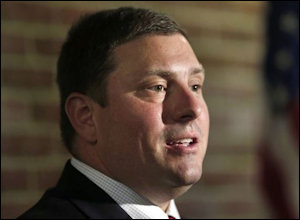
Fewer Virginia students will take end-of-course Standards of Learning (SOL) tests this spring due to revised regulations approved by the state Board of Education last year, making it impossible to compare school pass rates this year with the pass rates of previous years.
“This is a dramatic change in testing patterns,” said Superintendent of Public Instruction James Lane in a press release announcing the changes this morning. Pass rates for end-of course SOL tests in mathematics, science and history for 2018-2019 will mark the beginning of new trend lines, he added. “Comparing 2018-2019 pass rates with performance in 2017-2018 would be an apples-to-oranges exercise.”
The change comes after two years of falling SOL scores and revisions to Virginia Department of Education criteria for school accreditation. A third year of declining scores, especially in predominantly African-American schools, would have proved embarrassing for an educational establishment that has promised to narrow the white-black academic performance gap. It also would have called into question the efficacy of policies that de-emphasize traditional disciplinary policies in favor of a counseling-intensive, social justice approach.
“The Board of Education sees value in limiting the number of high-stakes assessments required to earn a diploma and in allowing students to demonstrate content knowledge through performance-based assessments,” Board of Education President Daniel Gecker said. “The revised graduation requirements maintain high expectations for learning while providing more flexibility for teachers in delivering instruction and more opportunities for students to develop life skills useful beyond school.”
The VDOE press release explains the changes:
The new graduation requirements became effective with students who entered the ninth grade in the fall of 2018 (class of 2022). The number of standard credits for a Standard Diploma and for an Advanced Studies Diploma remained the same, but the number of required verified credits — earned by passing a course in the content area and passing the associated end-of-course SOL test — was reduced to five (one each in English reading, English writing, mathematics, science and history/social science) for both diplomas.
In addition, all high school students are no longer required to take end-of-course SOL tests if they have already earned a verified credit in the subject — unless additional testing in mathematics or science or both is required by the Every Student Succeeds Act, also known as ESSA. The federal law requires annual testing in reading and mathematics in grades 3-8 and at least once in high school. Students must also test in science at least once in elementary school, at least once in middle school and at least once during high school.
“This year marks a major step toward the creation of a balanced assessment system that supports classroom innovation while maintaining accountability for improving outcomes for students,” said Lane.
Bacon’s bottom line: So, what does this mean? The press release doesn’t come close to answering all the questions I have.
But two things are clear enough. First, fewer students will take the SOLs. Students who qualify for opting out are those who have already earned a verified credit in the subject area, which implies (1) that fewer qualified students will take the tests, and (2) that the pass rate for those who do test (those who did not already earn a verified credit) will be lower. Comparing average pass rates this year with last year would, as Lane suggests, compare apples with oranges.
Very convenient.
Second, schools will rely more upon “performance-based assessments,” whatever they are. Pardon me for suspecting that (1) such assessments will vary from school district to school district, if not school to school, (2) a higher percentage of students will be deemed to meet grade requirements, and (3) once standards are lowered sufficiently, the black-white performance gap will miraculously shrink.
What do schools gain in exchange for the loss in accountability? That’s not quite clear, but the press release offers hints. “It is really exciting to travel around the state and see how teachers are taking advantage of this opportunity to engage their students in real-world challenges that promote deeper learning across the curriculum.
So… students will be getting “deeper learning.” And how will we know if such “deeper learning” is taking place?
We won’t.
The biggest losers, of course, will be African-American kids stuck in failing schools and fooled into thinking they’re getting a real education.

Leave a Reply
You must be logged in to post a comment.